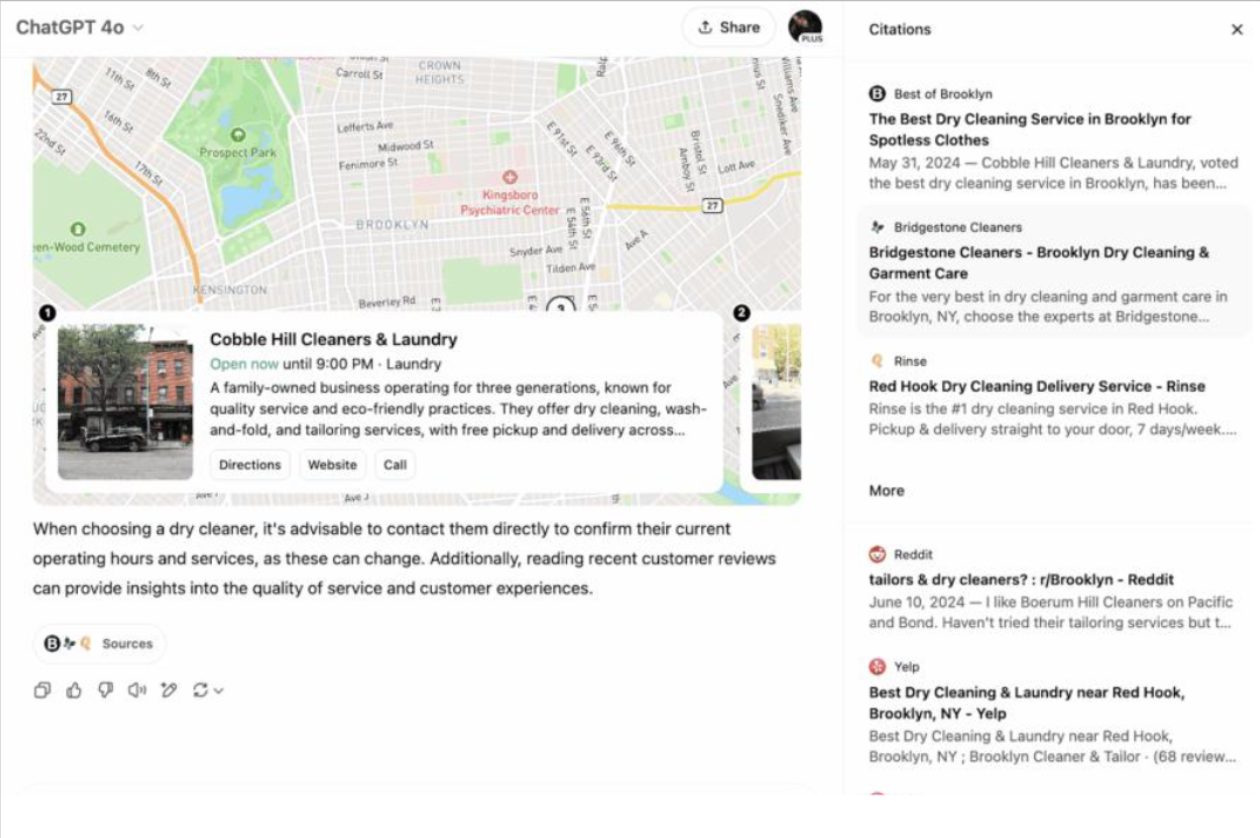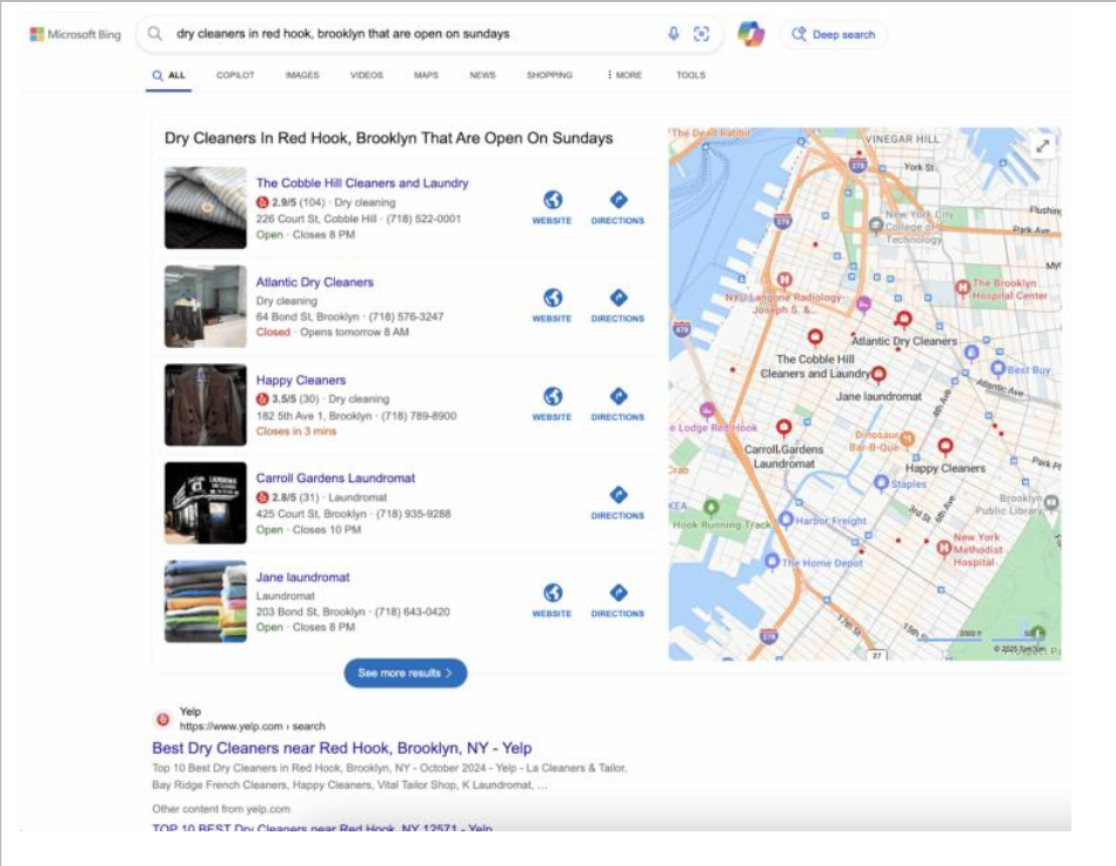ChatGPT now offers more accurate local search results by leveraging Bing data. Learn how it works – and what steps local businesses can take to maintain visibility.
Although Google remains the leader in local search, ChatGPT has made significant progress.
While still trailing Google, its local results have improved since we last ranked it among AI search tools less than a year ago.
The key shift? ChatGPT began tapping into Microsoft Bing’s search index in fall 2024.
While it now retrieves data from Bing, ChatGPT uses its proprietary algorithm to interpret and present the information.
This means that the most effective way to boost your business’s visibility in ChatGPT results is to ensure you’re listed in Bing’s search index.
That said, ChatGPT handles local search queries differently than Bing does. Some notable differences were discovered by comparing queries side by side and analyzing how ChatGPT assembles local search results.
ChatGPT draws from Bing Search, but results may differ
When ChatGPT was asked for dry cleaners in Red Hook, Brooklyn, that are open on Sundays, it responded with a map and three listings, similar to the local pack you’d see in Google.

The references span a mix of city guides such as Best of Brooklyn, business directories, and user-generated platforms like Reddit and Yelp.
Running the same search on Bing initially yields a similar-looking result, but close inspection reveals several important differences.

For instance, the top result—The Cobble Hill Cleaners and Laundry—appears identically in both ChatGPT’s list and Bing’s.
However, the second entry from ChatGPT, Bridgestone Cleaners, shows up much lower on Bing, ranked 14th as Bridgestone Dry Cleaners & Bridal Care.
Meanwhile, the third listing, Brooklyn Cleaner & Tailor, is absent from Bing’s results.
While there is some overlap, these discrepancies suggest that ChatGPT’s output isn’t simply a repackaging of Bing’s search results.
What’s going on here?
ChatGPT Cannot Access Bing’s Local Business Profile Information
- ChatGPT does not access or utilize business profile data managed through the Bing Places for Business platform.
- It cannot retrieve third-party enhancements from Bing listings, such as reviews from platforms like Facebook or Yelp.
- It does not have visibility into the maps or geographic displays that appear with Bing local business results.
These limitations have been confirmed through a series of in-depth questions with ChatGPT to better understand how it generates local search information (detailed further below).
ChatGPT Now Integrates Bing Web Results
ChatGPT initiates a Bing search using the relevant local query, retrieves the top 20–30 search results, and then organizes the information based on its internal analysis and reasoning.
The priorities of ChatGPT diverge in several ways from those of a search engine.
For instance, when asked about top-rated local businesses in a certain category, ChatGPT said it goes through this process:
- Initial scan: ChatGPT reviews the top 20-30 search results, focusing on store websites, review aggregators, niche blogs or local guides, and directories.
- Deeper dive: From this pool, ChatGPT narrows down to 5-8 sources that appear the most relevant and informative.
- Selection filter: ChatGPT selects 3-5 sources that display an average star rating, offer unrestricted access without paywalls, and are both verifiable and linkable.
ChatGPT Uses Its Own Standards to Filter and Display Results
In the “Deeper dive” phase of the sorting process, the term “most promising” is used. For instance, for a search like “best store for snow gear in Eugene Oregon,” ChatGPT aims to find sources that appear to provide reliable, detailed, and well-organized information to answer the question effectively. It evaluates these sources based on several key criteria, such as:
Use highly relevant and specific titles or snippets, such as “Top 5 Ski Shops in Eugene” or “Eugene Outdoor Gear Guide,” to convey useful, immediately targeted information.
Prioritize trusted and authoritative domains, including:
- Retailer websites like REI.com
- Review platforms such as Yelp.com
- Local interest blogs (e.g., eugenemagazine.com)
- Official or credible sources like BBB.org, Facebook business pages, or reputable news outlets
- Rich metadata: “When a snippet displays details like business hours, star ratings, and addresses, it indicates that the page is well-structured and provides valuable information.”
- Unique content: “I tend to avoid repetitive listings from aggregators or generic directories such as Yellow Pages or outdated TripAdvisor pages unless no higher-quality alternatives exist.”
Regarding what ChatGPT means by “verifiable and linkable,” it defines “verifiable” as follows:
- You can independently verify the facts I reference by visiting the source yourself.
- The information I provide is precise, clearly dated when relevant, and properly attributed—never vague, anonymous, or lacking a credible source.
I avoid citing any content that appears to be unmoderated, user-generated fluff, or lacks reliable oversight.
It listed the following examples:
- A dedicated REI store page showcasing business hours and featured outdoor gear brands.
- A Yelp listing displaying a 4.7-star average rating based on over 100 customer reviews.
- A published blog article with a clearly attributed author and visible date of publication.
It also provided examples of sources that would fail to meet the “verifiable” standard.
- Content sourced from an unattributed forum comment without verifiable context or citation.
- A business name lacking identifiable online presence, physical address, or verifiable credentials.
- A website missing essential details such as contact information or an identifiable author or publisher.
ChatGPT explained that ‘linkable’ refers to a page with a direct URL that users can access freely, without needing to go through a paywall or subscription.
ChatGPT does not use Google as a source
This answer required a bit of in-depth research.
ChatGPT indicated in several responses that it retrieves local query data from multiple sources, including Google Search and Google Maps.
When asked directly, ChatGPT clarified it does not have direct access to Google.
ChatGPT may occasionally mention a business’s Google rating or include a Google Maps link, but only if that information appears on a website indexed by Bing.
The Map Is an Integral Part of ChatGPT’s Interface
If ChatGPT is independently applying its own logic to reorganize Bing’s web results, why do its results still resemble Bing’s local pack format, complete with a map, as seen in Bing’s local search results?
When asked about this, initially, ChatGPT responded confidently that it does not generate maps, but it may occasionally copy a map from a web page found in Bing search results.
However, this was clearly not reflected in the local query results observed.
When mentioned to ChatGPT that the maps in its responses included features like a “List/Map” toggle and a carousel of business listings, it explained that these maps are not created by the language model itself. Instead, they are generated by the interface layer of the ChatGPT website—what ChatGPT referred to as “OpenAI’s front end.
ChatGPT states:
- “The map visually organizes businesses by leveraging the structured data I provide—such as names and addresses—through integration with a mapping service or platform.”
How Local Businesses Can Maximize Benefits from ChatGPT?
ChatGPT was asked:
- “Considering your explanations on handling local queries, what key strategies would you recommend to local businesses aiming to enhance their online visibility and secure prominent placement in ChatGPT’s responses?”
ChatGPT provided eight strategies, which are as summarized below along with some commentary.
Keep your website accurate and comprehensive.
ChatGPT often references business websites that appear in Bing search results.
Ensure your site features well-structured content, ideally using schema.org markup, including essential details like business contact information, operating hours, and customer testimonials.
This structured data helps signal to search engines and users that your website is trustworthy.
Claiming and optimizing your Bing Places listing is an essential tactic.
ChatGPT has clarified that Bing Places listings do have an indirect impact by influencing the web results that ChatGPT analyzes.
For example, businesses that rank highly in Bing local listings are more likely to have their websites appear prominently in organic search results.
Secure Your Spot on Trusted Review Sites
Maintaining accurate and up-to-date profiles on public platforms like Yelp and Facebook, especially with positive recent reviews, can significantly help you stand out.
Boost Reviews on Key Platforms
There are many reasons why this is a no-brainer, with ChatGPT being the latest.
Build Authority with Links from Local Directories and Media
ChatGPT specifically highlights local magazines, “best of” blog posts, and directories from local chambers of commerce.
Maintain Consistent Local SEO Best Practices
ChatGPT emphasizes the importance of maintaining consistent information across your website, local listings, and social media profiles.
Additionally, many other best practices mentioned earlier also apply to ChatGPT.
Deliver Distinctive and Easily Discoverable Content
“If your site features useful content like ‘How to choose ski boots’ or ‘Why eco-friendly dry cleaning matters,’ those pages can serve as valuable entry points that I might discover and reference.”
Track What’s Actually Ranking on Bing
Review the top 20 to 30 organic Bing search results for queries related to your business.
Identify opportunities to enhance your visibility in the results that ChatGPT is likely to reference.
To sum it up, here’s what ChatGPT highlights:
“Ensure your business is simple for Bing to interpret and straightforward for ChatGPT to cite.”
A concluding caveat
As ChatGPT itself reminds us in its footer: “ChatGPT can make mistakes. Check important info.” Hence, it’s important to approach the above mentioned explanations and suggestions with some caution.
Overall, the information ChatGPT provided aligns well with the results observed in its local queries and offers a clearer, more coherent explanation of how ChatGPT handles local queries.

